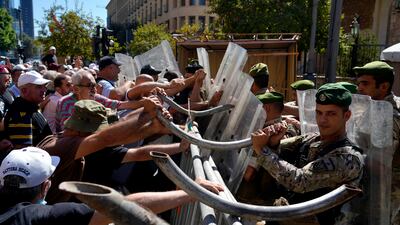Lebanon’s adoption of a 2022 budget on Monday is one of the key conditions stipulated by the International Monetary Fund in order for the country to receive a financial bailout, amid severe economic crisis.
But economic analysts say the budget — passed on Monday with only three months remaining of the year — flouts IMF recommendations.
Although the passage of an annual budget was one of the IMF conditions towards a financial bailout of $3 billion, the contents of the legislation fall short of the fund’s minimum requirements.
Historic economic decline
The IMF agreement — typically a last resort for economically struggling nations — is crucial to help Lebanon out of a three year-long economic crisis that is considered by the World Bank to be one of the worst in the modern history and shows no signs of abating.
Two-thirds of the population is impoverished and the local currency is worth only a fraction of what it once was, while public sector salaries have not kept up with inflation.
Despite Lebanon’s desperate need for structural change, to date no reforms have been successfully passed. It remains to be seen whether the IMF will recognise the passage of the 2022 budget as such.
“The main reason this budget wouldn't pass is that the IMF conditioned a healthy budget that has a very clear roadmap for fiscal sustainability, which this budget doesn’t have,” said Hussein Chaeito, a Development Economist at The Policy Initiative, a Lebanese think tank.
The 2022 budget was passed despite significant vocal opposition, with 63 votes in favour, 37 against and six abstentions. A previous attempt by parliament to pass the budget was impeded by a lack of quorum in mid-September when opponents deserted the session, calling out what they said were inconsistent and destructive measures contained within the bill.
“Everything in the public sector will be worthless within weeks because of how quickly the rate changes,” MP Razi Al Hajj told local media shortly before the session began Monday, referring to the country's volatile currency.
Following a visit to Lebanon last week, IMF staff said that with only three months of 2022 remaining the country should instead turn to creating a feasible budget for next year.
That budget should be based on realistic macroeconomic assumptions, enact measures for revenue generation and employ a unified exchange rate, the IMF said.
Controversial measures
Multiple finance experts who spoke to The National expressed concern that the budget does not reflect a clear economic policy.
The approved budget calculates a deficit, setting expenditures at 41 trillion pounds — around $1.2 billion according to the parallel market exchange rates which reflects the street value of the dollar — with revenue projected at 30 trillion pounds.
Experts worry the deficit could be higher.
“The heart of the crisis in Lebanon is unsustainable monetary and financial policy,” Mr Chaieto said.
For example, the budget triples the salaries for public sector workers — a core demand for ministry workers, public teachers and judges who for months have been on strike demanding realistic pay and better working conditions. Prior to the budget’s approval the average public sector worker earned the equivalent of $50 a month.
But while the rise in public sector wages seems at face value a positive development, finance experts say the move is temporary and detrimental.
“An increase in the salary of public sector employees ultimately comes at their expense. The money has to come from somewhere — so more money will be printed,” Mr Chaeito told The National.
“It’s a vicious cycle because whatever people are earning in income it will evaporate when the inflation sets in,” he added.
Among the most controversial measures stipulated in the new budget includes a change to the customs dollar, through which customs tax is calculated, normally fixed to the official exchange rate of 1,500 pounds to the dollar. This will now rise to 15,000 pounds to the dollar, which would effectively raise the price of imports to the country.
The struggling nation is reliant on imports for the vast majority of needs, including food and fuel.
The new measure adds yet another exchange rate to a slew of different rates currently in use. The official rate remains 1,500 to the dollar but subsidised goods are priced at 8,000 pounds to the dollar, while phone and credit card bills are calculated on the central bank’s Sayrafa rate of around 29,000 pounds to the dollar.
The parallel market rate upon which most goods and services are priced at fluctuates daily, currently sitting at 37,800 pounds to the dollar.
A rise in customs fees — while generating revenue for the state — would further drive prices up, hitting the impoverished population hard at a time when no adequate social protections are in place to minimise the weight of the burden, Mr Chaeito said.
The customs rate measure also goes against the unification of exchange rates called for by the IMF, which stated that the “existence of the multiple exchange rates causes significant distortions to economic activity”.
The varying exchange rates “undermine the operations of the public sector and creates opportunities for corruption and rent-seeking, leading to excessive pressures on the central bank’s FX reserves”, it said.
In other words the varying exchange rates contribute to Lebanon’s increasing reliance on informal economic activity, Mr Chaeito said, rather than creating economic equilibrium.
“It's a counterproductive piece of legislation, if you could even call it that,” said economist Henri Chaoul, a former adviser to Lebanon’s finance ministry.
Mr Chaoul was one of two members of Lebanon’s IMF negotiating team to resign in protest in 2020, citing institutional resistance and “no genuine will” to reform.
“It's a populist measure and has nothing to do with what the IMF requested,” he said.


